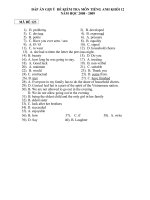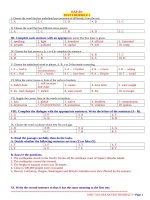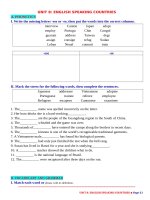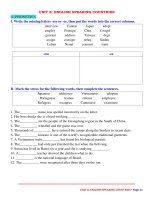7 đáp án e8 UNIT 7 (MLH)
Bạn đang xem bản rút gọn của tài liệu. Xem và tải ngay bản đầy đủ của tài liệu tại đây (63.46 KB, 4 trang )
ĐÁP ÁN
UNIT 7: POLLUTION
A. PHONETICS
I. Mark the stress in the following.
a'quatic
'chemical
bo'tanical
ener'getic
his'torical
scien'tific
'classical
dra'matic
'technical
po'etic
a'tomic
tra'ditional
'medical
'practical
'national
eco'nomic
'terrific
ath'letic
characte'ristic
bio'logical
II. Write the words from the box in the correct part of the table, according to the stress pattern.
Oo
scenic, tragic, comic, magic, global, central
Ooo
musical, logical, natural, physical, critical
oOo
historic; specific, heroic, artistic, horrific, arrival
oOoo
electrical, political, original, emotional, grammatical
oOo
scientific, systematic, academic
oOoo
technological, economical, mathematical
B. VOCABULARY AND GRAMMAR
I. Match the different types of pollution to the pictures.
1. visual pollution
2. air pollution
3. water pollution
5. noise pollution
6. light pollution
7. thermal pollution
II. Complete the sentences with the words or phrases in part I.
1. air pollution
2. radioactive pollution
3. Noise pollution
5. water pollution
6. thermal pollution
7. light pollution
4. radioactive pollution
8. soil pollution
4. visual pollution
8. soil pollution
III. Complete the sentences with the words from the box.
1. Sewage
6. contaminated
2. poison
7. effects
IV. Underline the right option.
1. sewage
2. pollutants
6. extinct
7. affect
V. Match the two halves of the sentence.
1. e
2. f
5. d
6. g
3. radioactive
8. pollutants
4. aquatic
9. dumped
5. Untreated
10. dead
3. sprayed
8. dumping
4. ends up
9. untreated
5. aquatic
10. spilled
3. b
7. c
VI. Choose the best answer to complete the sentences.
1. a
2. b
3. d
6. b
7. a
8. d
4. h
8. g
4. a
9. d
5. c
10. c
VII. Complete the sentences with the verbs in brackets. Use conditional sentences type 1
l. gets
6. recycles - won't produce
2. won't be
7. will have - dump
3. keep
8. continues - will rise
4. will help
9. keeps - won't be
5. don't stop - will become
10. will threaten - don't cut down
VIII. Complete the sentences with the verbs in brackets. Use conditional sentences type 2.
==========================================================================
ĐÁP ÁN UNIT 7: POLLUTION ▪ Page 1
1. were not (weren't)
2. would decrease
3. didn't dump
4. would be
5. bought
6. didn't bury - wouldn't pollute
7. wouldn't be - cared
8. would happen - was
9. paid - would be
10. polluted - would soon become
IX. Write conditional sentences type 2, using the cues given.
1. What would happen if water pollution stopped?
2. We would be happy if air pollution was the only problem.
3. If there was no more pollution, would the world be a better place?
4. If I were you, I would take these bottles to the bottle bank.
5. If people didn't really care about the environment, they wouldn't try to save it.
6. The river wouldn't be so polluted if factories didn't dump waste into it.
7. We would be less worried if oil spills didn't have such destructive effects.
8. If we destroyed the ozone layer, what would save us from the UV rays?
X. Complete the passage with the correct form of the verbs in brackets.
1. did
2. turned off
3. would save
5. recycled
6. would go
7. cycled
4. turned off
8. wouldn't need
XI. Complete the sentences with the correct form of the verbs in brackets.
1. don't recycle
2. had
3. would happen
4. will be
6. would rise
7. will increase 8. wouldn't die 9. won't be - don't
don't take
didn't dump
protect
5. didn't understand
10. were/ was would ban
XII. Use the correct form of the word given to complete each sentence.
1. unpolluted
2. contaminated
3. damage
4. deadly
6. pollution
7. damaging
8. untreated
9. contaminant
5. poisonous
10. death
XIII. Underline the correct preposition in each of the following sentences.
1. to
2. of
3. from
4. into
6. on
7. to
8. in
9. with
5. with
10. of
C. SPEAKING
I. Make questions for the underlined words.
1. What is water pollution?
2. Why is the river water heavily contaminated?
3. How many major types of pollution are there?
4. What would you do if you were the President?
5. Where does most of the plastic waste end up?
6. What are common effects of exposure to radioactive waste?
7. Which City is more polluted, Ho Chi Minh City or Da Nang?
8. How often is garbage collected in your neighborhood?
9. Who is responsible for solving environmental issues?
10. How can land pollution be prevented?
II. Complete the dialogue with the appropriate sentences (A- H).
1. F
2. G
3. A
5. C
6. B
7. D
4. E
8. H
D. READING
==========================================================================
ĐÁP ÁN UNIT 7: POLLUTION ▪ Page 2
I. Complete the passage with the words from the box.
1. source
2. even
3. honking
5. commonly
6. referred
7. unheard
II. Read the passage, then do the tasks.
A. Match the words to their definitions.
1. d
2. e
3. a
4. f
4. rural
8. loss
5. b
6. c
B. Decide whether the following statements are true (T) or false (F).
1. T
2. F
3. F
4. T
5. F
6. T
C. Answer the questions.
1. Plastic never decomposes.
2. About 7 million tonnes of plastic are dumped in the oceans every year.
3. We need to clean up the oceans to protect our sea creatures.
4. To help resolve this problem, we don't use so much plastic.
E. WRITING
I. Reorder the words to make full sentences.
1. Air pollution can directly contaminate the surface of bodies of water and soil.
2. We will save thousands of trees if we don’t waste so much paper.
3. What would you do if air pollution got really bad?
4. Polluted water causes the death of aquatic animals such as fish, crabs.
5. If we recycled more, less rubbish went to landfill sites.
6. Agriculture has an impact on land pollution due to the overuse of Chemicals.
7. Too much use of electric lights in cities may cause light pollution.
8. Water pollution is one of the most serious environmental problems of our time.
II. Complete the second sentence so that it has the same meaning to the first one.
1. If I were you, I would use energy efficient light bulbs.
2. He came up with a great idea for our environmental project.
3. Because of her absence from the meeting, she didn’t know the resolution.
4. If I had more free time, I would take part in the volunteer program.
5. If we don't reduce our plastic waste, we’ll threaten our own existence.
6. Since there was a hurricane last night, I was without electric power.
7. Toxic waste Products were dumped into the rivers or landfill sites.
8. Unless nations act, air pollution deaths will double by 2050.
9. Due to the rise in the world's temperatures, the Arctic keeps losing its ice.
10. If I didn’t live by the sea, I wouldn't be so worried about global warming.
⋆⋆⋆⋆⋆⋆⋆⋆⋆⋆⋆⋆⋆⋆⋆⋆⋆⋆⋆⋆⋆⋆⋆⋆⋆⋆⋆⋆⋆⋆⋆⋆
TEST FOR UNIT 7
I. Choose the word whose underlined part is pronounced differently from the others.
1. B
2. A
3. D
4. C
5. A
II. Choose the word whose main stress pattern is placed differently.
1. B
2. D
3. A
4. A
5. C
III. Complete each sentence with an appropriate word. The first letter of each word is given.
1. polluted
5. lead
2. effects
6. waste
3. damage
7. dead
4. wouldn’t
8. Untreated
IV. Choose the best answer A, B, C or D to complete the sentence.
==========================================================================
ĐÁP ÁN UNIT 7: POLLUTION ▪ Page 3
1. c
6. c
2. a
7. a
3. d
8. d
4. d
9. b
5. b
10. a
V. Choose the underlined word or phrase, A, B, c or D that needs correcting.
1. A → would
2. D → recycling
3. C → drink
4. C → results in
5. B → the largest
cause
6. D → to
7. B → unless
8. D → because of
9. B → would
decrease
10. B → cause
VI. Write the correct tense or form of the verbs in brackets.
1. used
2. will help
3. are dumped
4. has settled began
5. be caused
6. are
destroying
7. classified
8. increases will run into
9. would
happen disappeared
10. was
watching
11. buying
12. die
VII. Supply the correct form of the words in brackets.
1. environmentalist
6. dirty
2. disastrous
7. possibly
3. contamination
8. exposure
4. drinking
9. pressure
5. biggest
10. treatment
VIII. Match the questions to the answers.
1. e
2. d
5. c
6. f
3. h
7. a
4. g
8. b
IX. Choose the word which best fits each gap.
1. a
2. c
5. d
6. b
3. b
7. a
4. d
8. c
X. Read the passage carefully and do the tasks.
A. Find the word in bold in the passage that means:
1. conservation
2. harm
5. exhausted
6. pollution
3. floods
7. dump
4. carpooling
B. Choose the correct answers.
1. c
2. a
5. b
6. d
3. d
7. c
4. a
XI. Joining two sentences, using the words in brackets.
1. If we don't conserve water, we will face serious water
2. We didn’t enjoy our camping holiday because of awful weather.
3. Since plastic bags are non-biodegradable, they will remain in the environment for many years.
4. If Paul thought about the planet, he wouldn't waste so much water.
5. Water pollution can lead to the death of many aquatic animals such as fish.
6. The earth is getting warmer because the climate is changing.
7. Unless we stop cutting down so many trees, we will endanger our oxygen supply.
8. When people begin to recycle, they generate much less trash.
9. We are damaging the ozone layer even though the ozone layer is necessary for human existence.
10. Sue was exposed to radiation when she was young, so she is suffering from skin cancer.
==========================================================================
ĐÁP ÁN UNIT 7: POLLUTION ▪ Page 4









